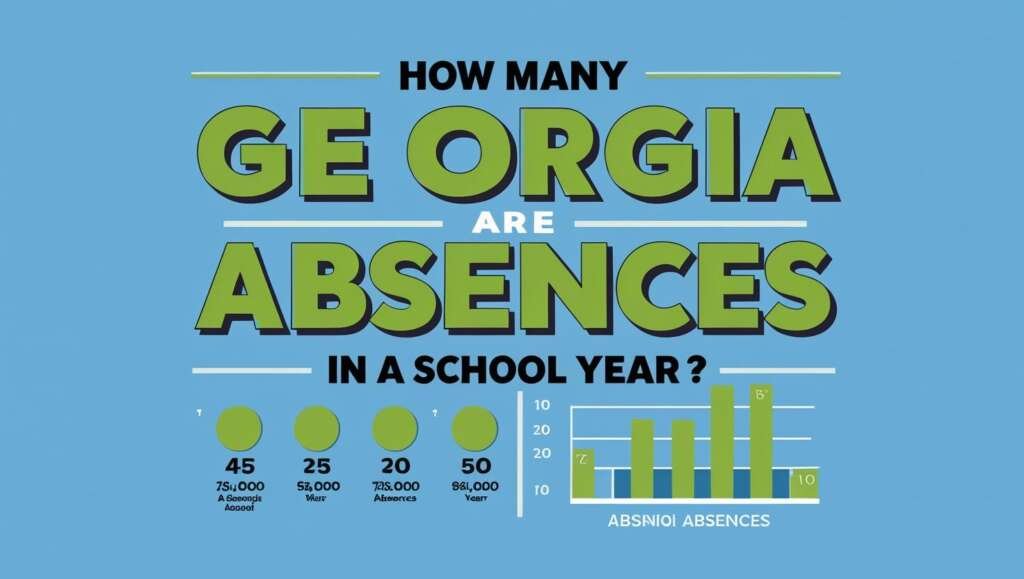When my son started kindergarten in Georgia, I’ll admit I didn’t pay much attention to the school attendance policy. If he had a cold, I kept him home. If we had a family event, I figured one day off wouldn’t hurt. But by the second semester, I received a letter warning me about excessive absences. If you’re a parent in Georgia, you might wonder: How many days can my child miss school before it becomes a problem? That’s a great question and an important one. Many parents don’t know the rules about school absences until they get a letter from the school or a phone call from the teacher. Too many missed days, especially without a valid reason, can lead to serious issues like poor grades, meetings with school staff, or even legal trouble.
Understanding Georgia’s School Attendance Law

Under Georgia law (specifically O.C.G.A. § 20-2-690.1), school attendance is mandatory for children ages 6 to 16. Every school district in Georgia must follow these state guidelines, although they may add additional local policies. Students are allowed up to 5 unexcused absences per school year without legal or disciplinary consequences. Beyond that, you may face interventions and possibly even fines or court involvement if it becomes chronic. But the longer, more helpful answer requires understanding the difference between excused and unexcused absences.
Excused vs. Unexcused Absences in Georgia
Not all absences are treated equally.
Here are some excused absences according to Georgia’s state board of education:
- Personal illness (with a doctor’s note)
- A serious illness or death in the immediate family
- Religious holidays
- Court appearances
- Testing or registration for post-secondary education (e.g., SAT)
- Conditions rendering attendance impossible or hazardous (e.g., inclement weather)
If your child misses school for one of these reasons and you notify the school with appropriate documentation, it will likely be marked as excused.
On the other hand, unexcused absences include:
- Oversleeping
- Vacations
- Lack of transportation
- Family events without prior school approval
- General absences without explanation
These count against your child and can lead to truancy concerns if they add up.
What Happens If Your Child Has Too Many Absences?
Once a child reaches 5 unexcused absences, the school is required to take action under the Georgia Compulsory Attendance Law. Here’s what typically happens:
At 5 Unexcused Absences:
- Parents/guardians receive a formal notice or letter.
- Schools may schedule a conference with the family.
- You’ll be asked to sign an Attendance Contract in some cases.
At 7-10 Unexcused Absences:
- The student may be referred to a School Social Worker or Attendance Support Team.
- You may have to attend a Student Attendance Review Board meeting.
- Intervention services may be offered (counseling, support plans, etc.).
10+ Unexcused Absences:
- The case may be referred to Juvenile Court or Truancy Court.
- Parents could face fines up to $100, up to 30 days in jail, or both (though jail is rare).
- Students could face loss of driving privileges (especially for high schoolers under 18).
What About Excused Absences Is There a Limit?
Yes, and this is where many parents get confused. Even if absences are excused, frequent missed days can still affect your child’s:
- Academic performance
- Promotion to the next grade
- Eligibility for awards, field trips, or extracurriculars
Georgia doesn’t place a hard legal limit on the number of excused absences, but most schools flag concerns once a student has 10 or more total absences even if excused. Many schools follow the “10-Day Rule”: If a student misses 10+ days, they may be required to provide medical documentation for every further absence not just a parent note.
How Many Days Can a Child Miss School and Still Pass in Georgia?
This depends on the district and school-level policies. Generally speaking:
- Students should not miss more than 10% of the school year (roughly 18 days in a 180-day calendar).
- Excessive absences, even if excused, may lead to:
- Failing grades
- Ineligibility for grade promotion
- Required summer school
Some districts allow “seat time recovery” where a student can make up time missed with after-school or Saturday programs. Ask your school about this if your child is nearing the limit.
Georgia Department of Education on Chronic Absenteeism
The Georgia Department of Education (GaDOE) defines chronic absenteeism as missing 15 or more days (excused or unexcused) during the school year. Chronic absenteeism is tracked by the state and is a factor in school performance reports. Schools are encouraged to identify at-risk students and implement early interventions, such as:
- Home visits
- Counseling services
- Academic support programs
Tips for Staying on Track With Attendance
Keep Communication Open
Always inform your child’s teacher or attendance office if your child is out, and provide a written excuse or doctor’s note.
Avoid Non-Essential Absences
Plan vacations during school breaks and avoid skipping school for minor issues.
Know Your School’s Policy
Each district may interpret the state rules slightly differently. Check your school handbook or website for local guidelines.
Use the Parent Portal
Most Georgia districts use online systems (like Infinite Campus) where you can track attendance in real-time.
Get Help If Needed
If your child struggles with anxiety, chronic illness, or school avoidance, work with counselors and social workers. Don’t wait until absences pile up.
Absences Matter More Than You Think
As a parent, I’ve learned that school attendance isn’t just about following rules it’s directly tied to academic success and long-term outcomes. In Georgia, missing too many days (especially unexcused ones) can snowball into a bigger issue than you realize.
If your child is struggling to attend school regularly whether due to health, emotional challenges, or other obstacles don’t wait for a letter or call from the school. Be proactive. Ask for help. Stay informed.


